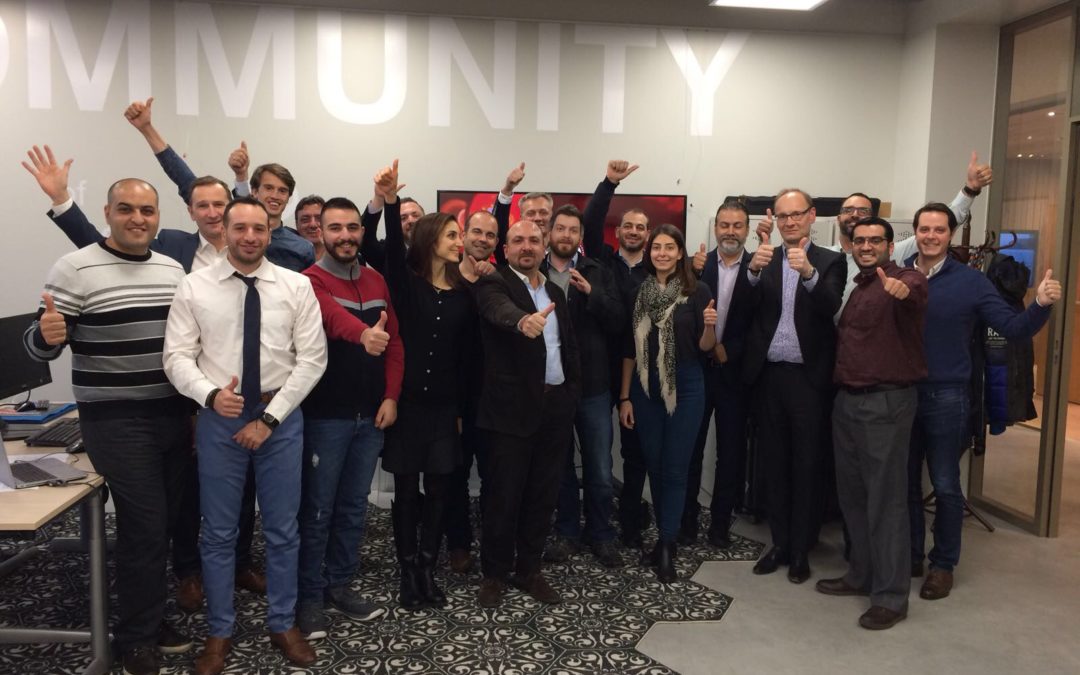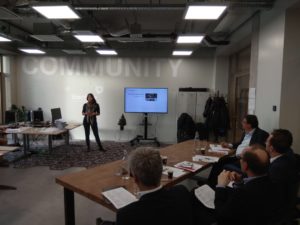Part of the program’s objectives to immerse Lebanese agri-food startups in the European ecosystem, six of the startups from the Agrytech Accelerator traveled to the Netherlands in an intensive four-day trip.
The startups, whose aspirations were closely aligned with expanding to Europe as a target market, would benefit from exposure to European experts, preparing them for a potential soft-landing program in the Netherlands.
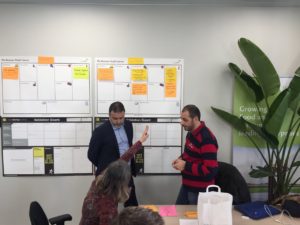 The high-impact visit was scheduled during the European FoodNexus Startup Challenge event at Wageningen University, Netherlands. The Startup Challenge featured 15 of Europe’s best food & ag-tech startups pitching for a chance to win €50,000 – exposing the Lebanese teams to the scope and quality of the top European startups.
The high-impact visit was scheduled during the European FoodNexus Startup Challenge event at Wageningen University, Netherlands. The Startup Challenge featured 15 of Europe’s best food & ag-tech startups pitching for a chance to win €50,000 – exposing the Lebanese teams to the scope and quality of the top European startups.
Scheduled on the trip’s agenda were one-on-one sessions with European food/ag-tech experts, pitch coaching sessions to provide Agrytech teams with feedback on their investment pitches, especially as they should be geared towards the European market, and pitching to European investors and potential partners. The startups who joined the trip had expectations ranging from receiving technical feedback, to exploring the potential of landing in Europe, to growing their network of mentors.
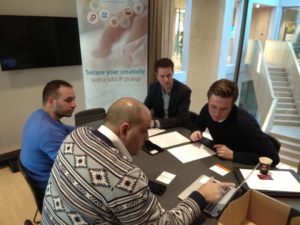 Start-Life and Food Valley, Agrytech’s Netherlands-based project partners, helped organize the visit, stay, meetings and pitching sessions for the seven startups. Start-Life is a Dutch Incubator that supports startups in the food and agriculture sector. It has partnered with the Agrytech program to provide their network, resources and experience to Lebanese startups in the program. Food Valley provides the Agrytech program with in-depth insights and share key knowledge in the agri-food sector.
Start-Life and Food Valley, Agrytech’s Netherlands-based project partners, helped organize the visit, stay, meetings and pitching sessions for the seven startups. Start-Life is a Dutch Incubator that supports startups in the food and agriculture sector. It has partnered with the Agrytech program to provide their network, resources and experience to Lebanese startups in the program. Food Valley provides the Agrytech program with in-depth insights and share key knowledge in the agri-food sector.
Over the 17 experts that were available and the different scheduled activities, each startup, despite it’s development stage, was set to receive the pointers that it required.
Smart Gourmet worked on the objective of exploring expansion to the European market. The startup has developed a sous-vide technique to cook, package and distribute, chilled ready-to-eat food with zero preservatives and longer shelf-life. Their team is the closest to realizing that goal, as their products are already being distributed in the Lebanese market. “The Netherlands is an industrial hub that is central to a lot of European countries with condensed Arab communities, an ideal market for our products. Our visit focused on understanding European rules and regulations and finding an export partner in Europe,” explained co-founder, Jad Atallah.
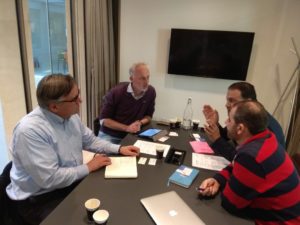 EasyReady, a startup who is developing their hummus mixing and dispensing machine, were already working with experts at WellDesign, a Dutch based company specialized in innovative, industrial design. The two teams met again during the trip to strengthen their collaboration. Also consulting with WellDesign is MekaPrep, a startup that is building manoushe vending machines. The team of engineers explored regulatory requirements for food systems built for the European market. Co-founder Abdel Kader Jahar had insightful meetings, “What I realize right now is that we are not ready to tackle the European market. Machine specifications in Europe are different and would cost twice as much to produce as the machine in Lebanon. We prefer focusing on the Middle East for the moment.”
EasyReady, a startup who is developing their hummus mixing and dispensing machine, were already working with experts at WellDesign, a Dutch based company specialized in innovative, industrial design. The two teams met again during the trip to strengthen their collaboration. Also consulting with WellDesign is MekaPrep, a startup that is building manoushe vending machines. The team of engineers explored regulatory requirements for food systems built for the European market. Co-founder Abdel Kader Jahar had insightful meetings, “What I realize right now is that we are not ready to tackle the European market. Machine specifications in Europe are different and would cost twice as much to produce as the machine in Lebanon. We prefer focusing on the Middle East for the moment.”
Science-based startup Startchy, a startup offering a bio-plastic coating for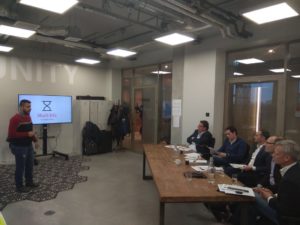 fruits and vegetables as an alternative to wax, met with experts to help validate their innovation, a critical step in their journey. It was also important to assess the regulatory requirements for their coating recipe for European markets. During his visit, co-founder Richardos Lebbos discovered the opportunities and challenges of launching in the European market: “The challenge is that Europe considers our product in the same category as food additives. It goes through the same process as the food additives in terms of testing and conformity. I learned that I will need to put my product through an EU certification process that might take up to 3 years.”
fruits and vegetables as an alternative to wax, met with experts to help validate their innovation, a critical step in their journey. It was also important to assess the regulatory requirements for their coating recipe for European markets. During his visit, co-founder Richardos Lebbos discovered the opportunities and challenges of launching in the European market: “The challenge is that Europe considers our product in the same category as food additives. It goes through the same process as the food additives in terms of testing and conformity. I learned that I will need to put my product through an EU certification process that might take up to 3 years.”
209 Lebanese Wine explored distribution, e-commerce, and logistics for operating their Lebanese wine distribution e-business in European markets. “I learned that the return on investment figures that we set as assumptions were much higher in Europe. The same marketing budget in Europe will get me more sales than in Lebanon because conversion rates for online sales is much higher: 1.5 to 2% in Lebanon compared to more than 5% in Europe. In other, terms 5 people out of 100 who visit the platform will buy in Europe versus 1 or 2 in Lebanon. This helps me build my feasibility.” explains the founder Salim Yasmin.
LifeLab is a startup providing turnkey vertical hydroponic modules. Although it was out of the program by the time of the visit, it accompanied the teams to attend a hydroponics lighting masterclass for startups that was taking place in the Wageningen University.
On her visit, Zeina Haroun, co-founder of Makanat, comments: “Networking for us was the most important thing. It was interesting to identify opportunities to grow the platform in different countries.” Her startup is building an online platform that connects food entrepreneurs and food businesses to short-term facility and processing line rentals.

